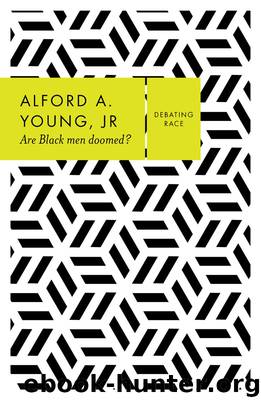Are Black Men Doomed? by Young Alford A. Jr.;

Author:Young, Alford A., Jr.;
Language: eng
Format: epub
Publisher: Polity Press
Published: 2018-01-12T16:00:00+00:00
I met Basil, Terrance, and Chris in 2008 while working on the Demonstration Project. In looking back on my three years of fieldwork there, this was my first research opportunity to focus exclusively on the kinds of Black men that seemingly were most doomed in the US. The crimes that the Black men that I encountered in this project were convicted of included homicide, burglary, assault, and narcotics distribution. Accordingly, some of them typified the most ominous kinds of Black men that others could imagine. Yet, my work in this project necessarily required an effort to look beyond their pasts and to consider how they contended with the possibility of a better future. This effort included having the chance to witness their efforts to act outside of the boundaries of the imagery often associated with the criminal element, especially Black male criminals.
Basil, Terrance, and Chris were former drug dealers who also spent much of their adolescence and young adulthood engaged in a wide variety of other illegal activities. Basil and Terrance were not successful in finding full-time work during my involvement with them for the assessment. That being the case, their comments reflect the kind of despair and frustration that comes with the absence of such an opportunity. More importantly, these remarks recall the ease with which Black men can be pegged as unworthy people and the deep emotional impact that such treatment can have. When put on paper, it is difficult to pierce through their comments to understand that the pain and suffering they were experiencing results from such stigmatization. Of course, some may feel that these men deserve to be so stigmatized. Yet, the problem at hand is not only one of whether these men deserve an opportunity to move beyond their pasts (after all, they did serve their sentences after being sanctioned for their transgressions). The problem is also a matter of what it means for Black men to bear the consequences of being perceived as criminally inclined, or unworthy of the kinds of self-improvement opportunities that most people would seek.
Sociologist Devah Pager has studied extensively how Black men, irrespective of their particular pasts, are assumed to be actual or potential criminals by employers who encountered them in interview settings (Pager 2007). Through a series of audit studies, she uncovered the extent to which merely appearing at an interview allowed Black men to be regarded by the interviewer as an actual or potential criminal, even if the constructed resume for those individuals was of equal quality to the White American men who were included in her audit studies of how potential employers react to Black men. The story of Theodore (a pseudonym), also a participant in the re-entry project, makes the case as well:
The biggest crock that they can give you in the world is that a man can be convicted in these courts, and then serve his time and he's paid his debt …Though I made those decisions to do those crimes and got myself in
Download
This site does not store any files on its server. We only index and link to content provided by other sites. Please contact the content providers to delete copyright contents if any and email us, we'll remove relevant links or contents immediately.
| African-American Studies | Asian American Studies |
| Disabled | Ethnic Studies |
| Hispanic American Studies | LGBT |
| Minority Studies | Native American Studies |
Cecilia; Or, Memoirs of an Heiress — Volume 1 by Fanny Burney(31333)
Cecilia; Or, Memoirs of an Heiress — Volume 3 by Fanny Burney(30934)
Cecilia; Or, Memoirs of an Heiress — Volume 2 by Fanny Burney(30889)
The Great Music City by Andrea Baker(21322)
We're Going to Need More Wine by Gabrielle Union(18074)
Bombshells: Glamour Girls of a Lifetime by Sullivan Steve(13109)
Pimp by Iceberg Slim(12933)
All the Missing Girls by Megan Miranda(12753)
Fifty Shades Freed by E L James(12451)
Norse Mythology by Gaiman Neil(11885)
Talking to Strangers by Malcolm Gladwell(11880)
Crazy Rich Asians by Kevin Kwan(8351)
Mindhunter: Inside the FBI's Elite Serial Crime Unit by John E. Douglas & Mark Olshaker(7835)
The Lost Art of Listening by Michael P. Nichols(6474)
Enlightenment Now: The Case for Reason, Science, Humanism, and Progress by Steven Pinker(6407)
Bad Blood by John Carreyrou(5770)
The Four Agreements by Don Miguel Ruiz(5511)
Weapons of Math Destruction by Cathy O'Neil(5038)
We Need to Talk by Celeste Headlee(4871)
